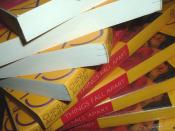Setting
The story takes place in the 1890s in the lower Nigerian villages, Iguedo and Mbanta in particular. It portrays the clash between Nigeria's white colonial government and the traditional culture of the indigenous Ibo people.
The Role of Women
Women are expected to obey their husbands. Achebe shows that the Ibo assign important roles to women. For instance, women painted the houses of the egwugwu (Achebe, 1986:84). Women are the primary educators of children. Through story telling and behaviour, they educate and socialize the children, inspiring in them curiosity about social values and relationships. The stories the women tell also develop the artistic consciousness of the children, in addition to entertaining them.
Furthermore, the first wife of the man in the Ibo society is paid some respect. This compliance is illustrated by the palm wine ceremony at Nwakibie's obi. Anasi, Nwakibie's wife, had not yet arrived and "the others [other wives] could not drink before her" (Achebe, 1986:22).
The importance of women's role appears when Okonkwo is exiled to his motherland. His uncle, Uchendu, noticing Okonkwo's distress, eloquently explains how Okonkwe should view his exile: "A man belongs to his fatherland when things are good and times are sweet. But when there is sorrow and bitterness, he finds refuge in his motherland." A man has both joy and sorrow in his life and when the bad times come; his "mother" is always there to comfort him. Thus comes the saying: "Mother is supreme."
Although women are viewed as the property of, first their fathers and then their husbands, they can be assigned very important roles in the religion of the tribe. Chielo is the priestess of the powerful god, Agbala, although she is an ordinary woman in the village.
Ibo Society and the Government
Umuofia society is proud,


